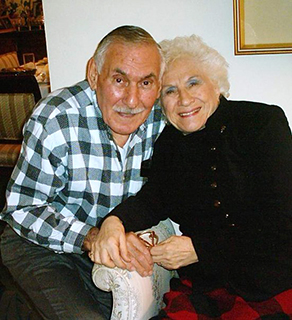Secrets to a happy Jewish marriage—toothpaste and all
Permanent link All Posts
Max & Rita Sher
The Hebrew word for love is “ahava,” from the root hey vet, which means to give. To love, put simply, you must give.
How much do you think the divorce rate would plummet if all engaged couples knew the connection between these two words?
My cousins, Sarah and Chuck, married for more than 48 years, certainly do. I once asked the Chicago couple how they’ve made their happy Jewish marriage last. One word, Chuck told me—generosity. “Be generous with your time,” he said. “And give of yourself.”
In honor of this month’s love issue, I wanted to gain some new insights about love and marriage so I recently called up my two sets of wise marriage mentors—my parents and grandparents. Judy and Neal Sher, my parents, who make a home for themselves in Minneapolis, have been married for 42 years. My Long Island-based grandparents, Rita and Max Sher, will celebrate their 66th wedding anniversary in the spring.
So it turns out both couples know a thing or two about the topic at hand.
.jpg)
Judy & Neal Sher
Both conversations sounded like a ping-pong game, the marital advice bouncing back and forth between the two sets of spouses. They’d finish each other’s sentences as couples tend to do when they’ve been together as long as these pairs have. When they weren’t interrupting each other, they were laughing—a lot.
For both couples, their personalities are polar opposites, but their Jewish values are in sync.
All four talked about how giving to each other leads to shalom bayit, peace and harmony in the home. Never let an argument fester, they told me. “If something about the other person annoys you, have it out—have the uncomfortable conversation,” my dad said. “Don’t hold a grudge and never go to bed angry.”
“Yield to the other one,” my grandma said. “You can’t have your way all the time.”
Back in 1946, right after my grandfather returned home from serving in the Pacific, my great-aunts fixed up my grandparents. My grandma’s sister and my grandpa’s sister, close friends with each other, thought Rita and Max would make a good pair, so they invited them to a party to get them in the same room with each other. Four months later, they married. They would eventually have two sons.
In their day, there wasn’t so much obsessing, like nowadays, about whether their intended was their perfect match. “It’s a different world today—let me put it that way,” my grandpa told me.
When I asked what attracted them to each other, my grandpa said he liked having an intelligent woman to talk to. “Oh, thank you,” Rita replied, in a faux British accent. And what drew Rita to Max? “He was good looking and tall and we just got along nicely.” Simple as that. They liked what they knew about each other and whatever they didn’t know, they’d learn along the way.
Sixty-five years later, they know each other pretty darn well.
Today, my grandma’s slowing down, and she can’t do as many tasks for herself, so my grandpa is there for her more now than ever before. “He shops, he cooks for me,” she said. “You’d do it for me too,” Max added.
Like my grandparents, my parents were set up too. In 1969, my parents were attending college and grad school in Boston. One day, my mom mentioned to friends that she wanted to see an obscure documentary film. A bystander overheard her and insisted my mother meet this friend of his, Neal, who also loved seeing obscure movies. When the bystander-turned-matchmaker called my dad to give him my mom’s number, he told my dad, “You’re going to marry this girl.”
When Judy and Neal spoke on the phone for the first time, she dug his voice and he loved her laugh. On their first date, they talked for hours over Chinese food. And then, at meal’s end, my mom opened two fortune cookies. The first said, “Your present love is a true and lasting one.” The second read, “Your home will ring with the laughter of children.” The cookies were prescient: they married a year later and would go on to have two daughters, my sister and me.
I asked my parents the secrets to a happy Jewish marriage, hoping some of their marital wisdom would trickle down to me, the next generation, when I tie the knot someday.
“You need to work at a marriage even if you’ve been married a long time,” my dad said. “Keep it fresh and pretend you’re still dating. Make it special and don’t take the other person for granted.”
“Have a sense of humor,” Mom chimed in. “Have a sense of humor about yourself.”
“Don’t try to change the other person in terms of anything important,” my dad said. “It’s okay to be annoyed if someone isn’t neat, but don’t try to change fundamental things, their values.”
My mom may have offered the best marriage advice of all. She said the secret to a happy marriage is to focus on the big picture and not to sweat the small stuff. “Don’t worry if your spouse doesn’t cap the toothpaste, or squeezes the toothpaste from the middle of the tube,” she said. “It’s how he treats you—not how he treats the toothpaste tube—that counts.”



.jpg)



